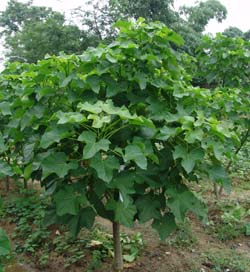Location:
Home > News > Events
Large-scale gardens for energy-rich plants to be set up at CAS
Print |
Close Text size:A A A
A research under the title of "Screening & Assessment of Energy Plants & Core Technology for Large-Scale Plantation of the Physic Nut Tree" has recently been initiated as an important project of the CAS Science Cluster for Advanced Industrial Biotechnology.
Organized by the CAS Xishuangbanna Tropical Botanical Garden (XTBG), the project is to set up platforms for the studies of energy plants in central, southeast and southwest China by evaluating and protecting the rich plant germplasm resources housed in the CAS botanical gardens.
As the physic nut tree (Jatropha curcas L.) is considered a favorite species for the production of biofuel, the researchers will make efforts to provide superb germplasm resources and technical guarantees for the industrialization of the plant.
The project is to make preliminary investigations on various energy plants, including those rich in carbohydrate and with high content of fat, so as to provide scientific basis and research schemes for the future utilization and strategic reservation of biomass energy sources in China, says XTBG Director CHEN Jin, adding it will also offer optional plans to address energy problems in this country and carve a niche for China's research at the frontier of the field.
At the same time, the researchers will focus on know-how for large-scale plantation of the physic nut tree by establishing three gardens of considerable size as experimental platforms in central, southeast and southwest China. The studies will involve collecting and assessing of germplasm resources of the plant from different regions, defining its core germplasm, renovating new ones, and cloning key genes featuring anti-adversity and fat metabolism functions, as well as developing cultivation techniques of high-yield breeds and development, according to Chen.
The project strives to make breakthrough progresses on key technologies to address some of the problems in the manufacturing of bio-fuel from the plant, such as low per unit production, unstable oil-yielding rate, limited distributions, high ignition points of its biofuel, low-temperature jellification, and lower economic returns in comparison with petroleum derivatives.
Over the next three years, CAS will construct three sanctuaries for energy plants with a considerable size at its botanical gardens in Xishuangbanna, Wuhan and Guangzhou. The researchers will make observations on biological properties of some 100 varieties of such plants, and carry out analyses on their components. Demonstrative bases for their bumper harvest will be set up. Outstanding strains or mutants noted for their high-yield, fatty seed and strong adversity resistance will be sleeted and bred. It is expected to obtain, and file for, patents on some functional genes concerning the fat metabolism and endurance against frigid temperatures.
"We are now fully confident of making the physic nut a model plant for such studies in China by joining efforts with business sectors and farmers," Chen stresses.

